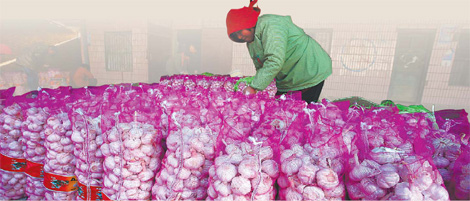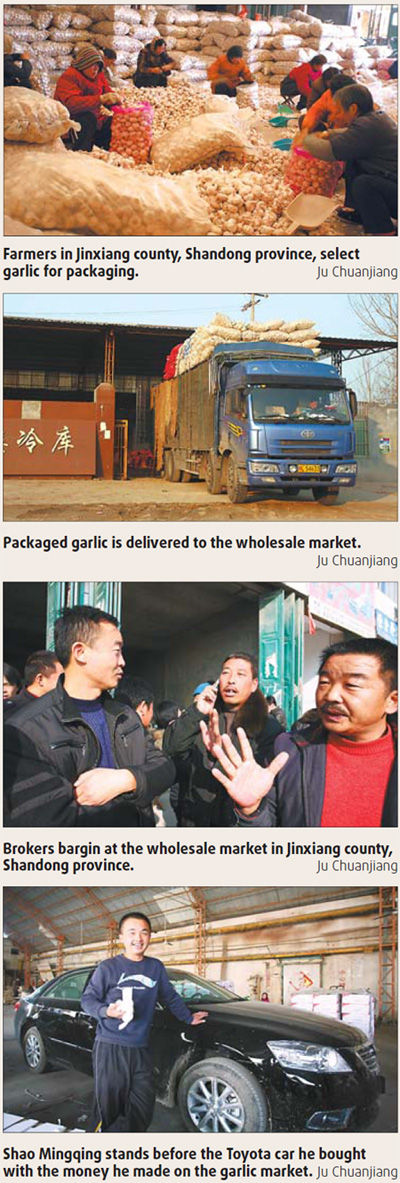


Shao Mingqing was a jobless young man from Shandong province with only a junior high school diploma when his luck turned around a few months ago with the skyrocketing price of garlic.
The 22-year-old Shao now drives an 180,000-yuan Toyota he bought with the money he made on the garlic market.
Shao's face was lit up with joy when he talked about his recent success.
"I borrowed some money and decided to buy 100 tons of garlic at the price of 3.2 yuan per kilogram (kg) in September," Shao said. "I made a profit of 400,000 yuan from selling it at the price of 7.2 yuan a month later."
Shao isn't the only one who has made a tidy fortune out of garlic, which has exceeded gold and stocks as the country's best performing asset this year.
Garlic trading has created a handful of new millionaires overnight in Jinxiang county, Shandong province, China's largest garlic producing area.
"What we made was just some petty profits. There are people who made hundreds of millions of yuan from it," said Han Yunzhe, a garlic trader who bought a 300 sq m house with his earnings from garlic trading.
Garlic prices in Jinxiang county have skyrocketed more than 50 times since last October, when the wholesale market price hit a low of 0.15 yuan per kg. Now garlic is traded for more than 8 yuan per kg on the market.
The soaring garlic prices are creating a frenzied mood among market speculators as they seek new opportunities to buy and store as much garlic as possible, betting the price will surge to a new high in coming days.
Rich coal mine bosses, according to some media reports, have also joined the garlic market, hoping to reap huge profits.
Some real estate speculators, who have earned big money in China's overheated property market, also are gambling on garlic, according to media reports.
Price drivers
Experts said one trigger of the sharp rise in garlic prices might stem from the idea that garlic can help prevent infection by the H1N1 virus, although there is no scientific evidence to support the idea.
But the root factor is the extremely low price of garlic last year, which resulted in a sharp reduction in garlic production, others said.
Garlic farmers in Shandong province retreated from garlic planting as the selling price of garlic dropped to 0.08 yuan per kg last year.
"The reduction in garlic production plus public panic over the H1N1 flu have caused garlic prices to shoot up," said Nie Binghua, director of the Shandong Economic Management Institute.
But Nie noted that the high price is unlikely to affect the overall economy, because garlic is not a crop that will affect food security.
Production of garlic in Shandong province dropped by 40 percent this year. And in 2008, the country reduced total garlic planting areas by 50 percent, giving speculators a reason to believe that there might be a sharp shortage of garlic in the near future.
"The fact that supply can't keep up with demand caused soaring garlic prices," said Liu Zhangjian, governor of Jinxiang county.
Liu said he worries that surging prices will persuade too many farmers to plant the crop at the same time, which might cause excess supply and a nosedive in prices next year that would eventually hurt the interests of farmers.
"As the main garlic production area, the local government does not want the price to be volatile," Liu said.
China is the world's largest garlic exporter, followed by Argentina and Spain, and is meeting three-fourths of the world's garlic demand. China now has more than 1,200 storage houses and 700 garlic processing and export companies.
China exported 1.52 million tons of garlic last year, 70 percent of which was produced in Jinxiang. Garlic has been a pillar industry in Jinxiang, which once produced 1 million tons of garlic a year.
Less for farmers
But unlike market speculators who have pocketed huge profits in recent months, the benefits to garlic farmers from surging prices are much smaller.
Zhang Yuanjin, a garlic farmer in Jinxiang county, sold his crops at the price of only 0.6 yuan per kg in July this year, because Zhang, like many farmers, could not obtain sufficient market information. Unlike some garlic traders, he also did not own big storage houses.
"The price jumped to 1.4 yuan immediately after I sold mine," he said.
Zhang made only 9,000 yuan this year by selling the garlic he grew last year. Still, his earnings were three times more than last year, he said.
He said he would not grow more garlic next year because of the rising cost of garlic seeds and fear of a price nosedive in the market next year.
Most garlic brokers, however, said they believe the price will stay high for the next two years. They base their optimism on speculative market expectations among garlic traders and rising demand from abroad, they said.
Shandong province exported $88.6 million worth of garlic in September, a 109 percent increase from the same period last year, according to the Shandong Provincial Commerce Department. The export price jumped to $1,000 per ton from last year's price of $200 to $300 per ton.
Industry insiders estimated that the garlic price will hit a new high by the end of this year.
Insiders said demand from home and abroad will be boosted during the upcoming Christmas and Chinese New Year holidays, since garlic is a popular seasoning and important raw material for processing many foods.
But experts cautioned against over-reacting to the surging price of garlic.
"The garlic market is cyclical. Price rises are short-term, and they will fall again before long," Yi Xianrong, a researcher with the Chinese Academy of Social Sciences, was quoted by Reuters as saying.
Experts estimated that garlic price volatility is likely to be a three-year cycle, and that the future price of garlic will fall back to the normal level at between 1.4 yuan to 2 yuan per kg.
Other experts said the speculation driving skyrocketing prices cannot be sustained.
Jerry Lou, a Morgan Stanley China strategist, said that speculators, financed by abundant liquidity sloshing around the country, had moved into the relatively small garlic market and manipulated prices.
Lou described the tools of the trade used by garlic speculators.
"You need a warehouse, a lot of cash and a few trucks. That's how it works," Lou was quoted by the Financial Times as saying.
"Basically, what you do is try to arrest as much supply as possible. Then you bid up the price. Moving garlic from one warehouse to the other, you make millions of dollars," Lou said.
Contributed by Wang Qian

(China Daily 11/30/2009 page12)













